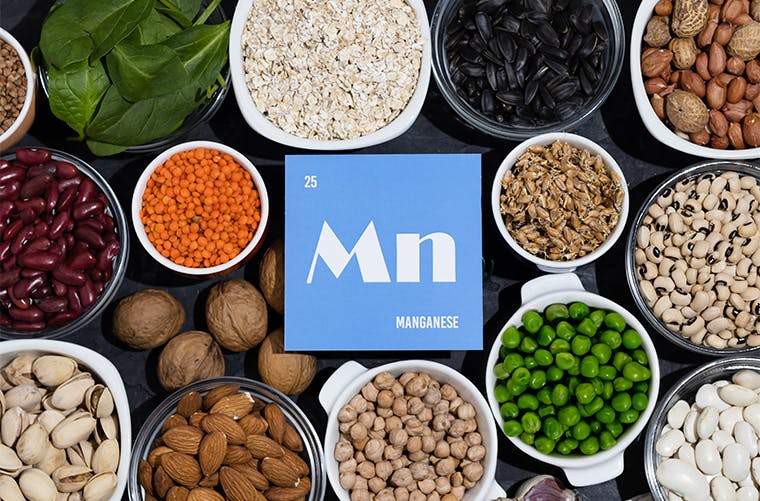What Is Manganese?

When we think about essential nutrients, vitamins and minerals like vitamin C or calcium probably come to mind. However, there are plenty of lesser-known nutrients that play an important role in our overall health but are often overlooked. One such nutrient is manganese—a trace element that’s essential to a variety of your body’s functions.1 Learn more about this underrated mineral, explore its remarkable health benefits, and incorporate it into your diet with manganese-rich foods.
What Is Manganese Used For?
Manganese is a mineral that occurs naturally in many foods and is available as a dietary supplement. It’s essential for various biological processes in our bodies, including our metabolism, bone health, immune system and more. Our bodies contain 10 to 20 mg of manganese, 25-40% of which is stored in our bones.2
Manganese is primarily stored in the liver, kidneys, pancreas and brain and assists with numerous enzymatic reactions that are vital for our health.2 Unlike macrominerals such as calcium, magnesium and sodium, we only need small amounts of manganese, making it a trace mineral.3
The Benefits of Manganese
Manganese helps maintain our bodies by aiding in the following:
1. Bone Health
One of the key benefits of manganese is its role in maintaining strong and healthy bones. It works alongside other minerals to support bone development and maintenance.2 Manganese is essential for the production of collagen, a protein that provides structure to bones and connective tissues.3
2. Antioxidant Defense
Manganese plays a key role in boosting our body’s antioxidant levels and immune system. Manganese helps activate the enzyme and antioxidant called superoxide dismutase (SOD). Antioxidants, including SOD, help neutralize harmful free radicals to prevent cell damage.3
3. Energy Metabolism
We need energy to function, and manganese plays an important role in the production of energy and your metabolism. Your body uses enzymes and manganese to break down the macronutrients you eat, including amino acids, proteins, carbs, and sugars. Manganese also helps your body use vitamins such as choline, vitamin C, thiamine, and vitamin E.3
4. Wound Healing
Manganese is involved in the formation of blood clotting and hemostasis (the process that stops bleeding), which are essential for wound healing. It helps the blood clot properly to prevent excessive bleeding when you get injured.2 In addition, when your wound needs to heal it creates collagen, a protein that helps your body form connective tissues. Your body uses manganese to create the amino acid proline, which is needed to create collagen.3
5. Brain Health
Your brain uses manganese to help your neurons, or nerve cells, send signals to each other. Some studies even suggest that manganese can improve brain function, but more research is needed.3
Where to Find Manganese
Now that we understand the importance of manganese, lets learn where we can find it. Thankfully, getting enough manganese is relatively easy if you eat a balanced diet.
1. Dietary Sources
Manganese is abundant in a wide range of foods, so you can naturally increase your intake by including the following in your diet:2,3
- Nuts and Seeds: Almonds, hazelnuts, pecans and pumpkin seeds are excellent sources of manganese.
- Whole Grains: Oats, brown rice and whole wheat products are rich in manganese.
- Legumes: Beans, lentils and chickpeas are good sources of manganese.
- Shellfish: Clams, oysters and mussels all contain manganese.
- Leafy Greens: Spinach and kale are examples of manganese-rich vegetables.
- Tea and coffee: Black and green teas and coffee contain manganese, so sipping a cup can contribute to your intake.
- Black pepper: Certain spices, including black pepper, include manganese.
2. Manganese Supplements
While most of your manganese should come from a healthy, diverse diet, supplements are available for people who need to boost their manganese intake. In general, many manganese supplements are available in a variety of different forms.2
3. Water
Interestingly, the water you drink can influence your manganese intake. Water typically contains small amounts of manganese at concentrations of 1 to 100 mcg.3
Manganese may not be as well-known as other nutrients, but it plays a vital role in maintaining your health. A balanced diet rich in diverse foods is the best way to ensure you get all your essential nutrients, including manganese. If you’re looking for additional immune support,* try new Emergen-C Crystals when you’re on the go. Emergen-C Crystals include vitamin C and manganese for immune support* and B vitamins to enhance energy.
*This statement has not been evaluated by the Food and Drug Administration. This product is not intended to diagnose, treat, cure, or prevent any disease.
Source Citations:
- Mayo Clinic: Manganese Supplement - Oral Route, Parenteral Route. https://www.mayoclinic.org/drugs-supplements/manganese-supplement-oral-route-parenteral-route/description/drg-20070154. Accessed 10/10/23.
- National Institutes of Health (NIH): Manganese - Health Professional Fact Sheet. https://ods.od.nih.gov/factsheets/Manganese-HealthProfessional/. Accessed 10/10/23.
- 5 Health Benefits of Manganese – Cleveland Clinic. https://health.clevelandclinic.org/manganese-benefits/. Accessed 10/10/23.